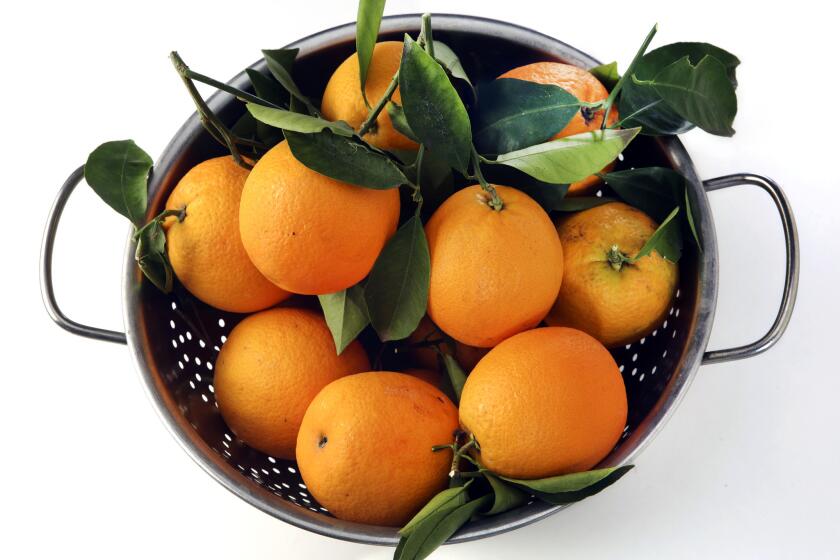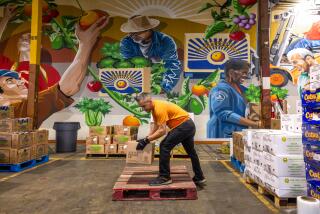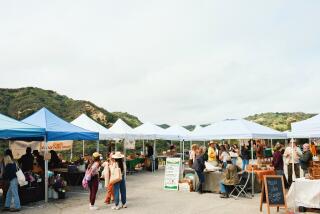‘Buy more fruits and vegetables’: L.A.’s produce wholesalers are seeing a 90% drop in sales
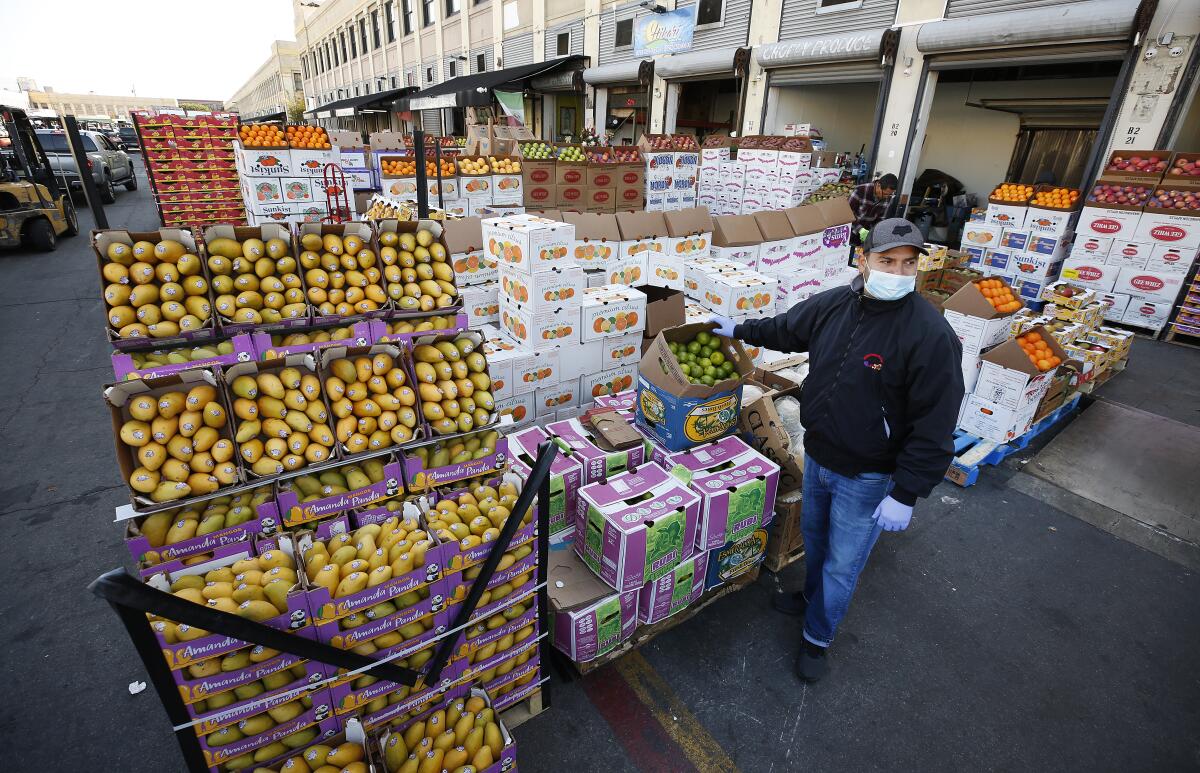
Need a case of strawberries? How about blueberries? Raspberries? Mangoes?
Carlos Franco of Elias Produce has tons — literal tons — of fruit sitting in his walk-in cooler right now with no place to go.
The 29-year-old produce distributor is one of 88 vendors at the 7th Street Produce Market downtown who’ve seen an alarming drop in sales in the wake of the coronavirus pandemic, with many reporting declines of 90% or more.
“Before I might sell 20 cases of strawberries to a place each week,” Franco said. “Now I’m lucky if they order one or two.”
If you’re worried about coronavirus on fresh produce, you don’t need to be, especially if you follow these tips for washing fruits and vegetables.
A major hub for wholesale produce distribution across the region, the market’s largely Latino mom-and-pop vendors supply restaurants, food service companies, bakeries and small neighborhood markets throughout Southern California, the majority of which have drastically cut the amount of food they are ordering in the wake of the coronavirus pandemic and the ensuing closures.
“Never in my life have I seen it like this,” said Isias Franco, Carlo’s father, who has run the family’s produce stand since 1990. “The closest was after Sept. 11, but that was only for a few days.”
Around 6 a.m. last Thursday — a time when the 122-year-old market normally hums with activity, Franco said — many of the produce “swampers” who load and unload trucks were left with little to do, squatting on plastic crates and leaning on hand carts in the crisp, early-morning air. Most wore disposable gloves, with masks or bandannas pulled over their faces. Forklifts and freightliners sat idle.
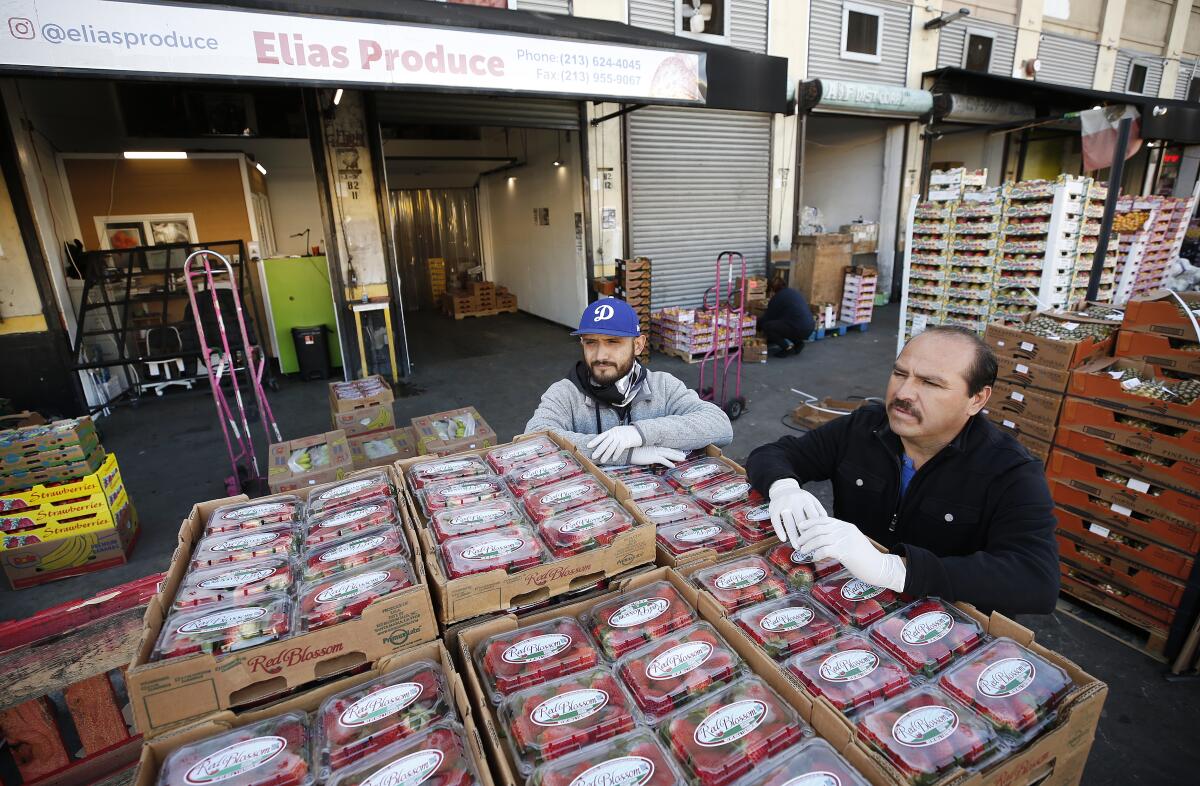
Though some vendors said sales initially spiked as shoppers emptied shelves at grocery stores in preparation for the city’s “Safer at Home” ordinance, much of that demand was for dry items such as beans and rice. Fruits and vegetables, which make up a bulk of the market’s business, didn’t see much of a boost, then dropped off dramatically.
Adolfo Ponce, the owner of Ponce Produce, said that sales of avocados, usually one of his most popular items, are down 95%.
“It’s slow and scary right now,” Ponce said, adding that restaurants and small grocers make up the majority of his customers. “Some days I make $100. That’s not enough to pay one employee.”
The widespread drop in demand has rippled through the industry, creating a backlog of produce that has already been picked or will be soon. Carlos Franco said his father recently received a call from a produce broker in Ventura who had a truckload of just-picked strawberries but no one to buy them. He told Carlos’ father to name his price, any price.
“The problem is we’re trying to sell what we already have,” Carlos Franco said. “It will keep in cold storage for a while but not forever.”
Some vendors have attempted to market their produce directly to the public, even offering home delivery, with limited success. Franco and a business partner are transforming a food truck they run called Amazebowls, which usually sells frozen acai bowls, into a mobile produce market, in hopes they can move some product.
Managers say they’re adding more social distancing measures to ensure safe shopping amid coronavirus outbreak.
Jonathan Sanchez of Choppy Produce, which recently had boxes of citrus, melons, bananas and other fruits stacked in front of its narrow storefront, said he is selling his inventory for less than he paid.
“We’re going to close after we sell what we have,” Sanchez, who sells to restaurants, food trucks, street vendors and swap meets, said. “I had hoped people would buy more fruits and vegetables at home, but they’re already stocked up on food and not going out.”
Expiring produce is usually donated to food banks and local churches, Sanchez said, but lately he’s seen fewer volunteers arriving to make their daily pickups and most churches are closed.
David May, a spokesman for the Los Angeles Food Bank, said that after an initial drop in volunteers two weeks ago, the organization is now “seeing a steady flow of volunteers both on-site at our two distribution centers and off-site at distribution sites.”
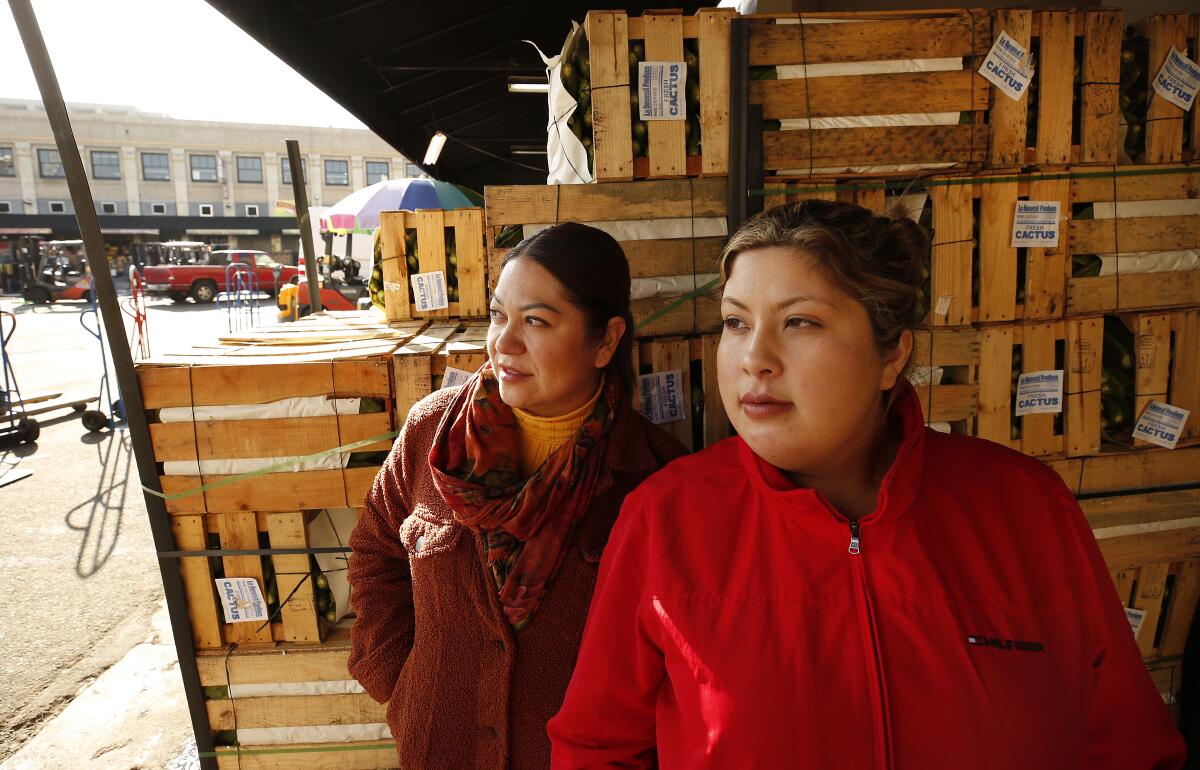
Melissa Leon, who runs La Sucursal Produce with her older sister Alejandra, is concerned about the effect closures at the 7th Street market will have on their customers. “We have market owners who drive from all over on Fridays to pick up their weekly order,” she said. “If the places here close, it’s going to be harder for them to restock.”
So far La Sucursal, which specializes in Latino produce and ingredients, has had to throw away unsold huauzontle — a Mexican herb that is traditionally popular during Lent — that spoiled. “Nobody is sure how long they can last like this,” Leon said. Her sister nodded solemnly in agreement. “Está muerte,” she said. It’s dead.
As the end of the month looms, Carlos Franco says his customers, who are on a 21-day credit system, owe money, or will soon, despite little to no income trickling in.
“We understand the situation because it’s the same one we’re in,” Franco said. “The bills don’t stop on our end either. We’re already getting calls from our suppliers asking to be paid.”
Franco said that vendors have floated the idea of asking the produce market’s owners, Atlas Capital Group, to forgive next month’s rent, but no formal request had yet been made.
The L.A. Business Journal reported in 2016 that since Atlas Capital Group took ownership of the property in 2014, many tenants have seen their rent increase by 20 to 25 percent, and the length of their leases shortened.
“The crazy part of all this is that inventory is fine. The field workers are still picking, and they’re putting themselves at risk to keep us fed. But the rest of the system is at a standstill right now,” Franco said.
“If the shutdown continues for another month, I don’t want to imagine that. A lot of people are going to be out of a job.”
The 7th Street Produce Market is currently open to the public, Monday through Saturday from midnight to noon. Parking is available at ROW DTLA adjacent to the market.
More to Read
Eat your way across L.A.
Get our weekly Tasting Notes newsletter for reviews, news and more.
You may occasionally receive promotional content from the Los Angeles Times.
